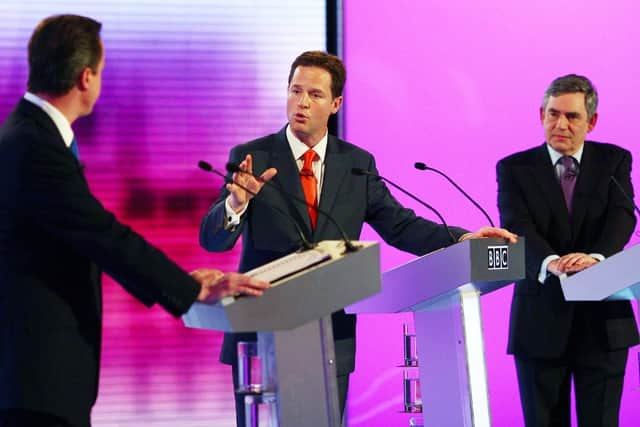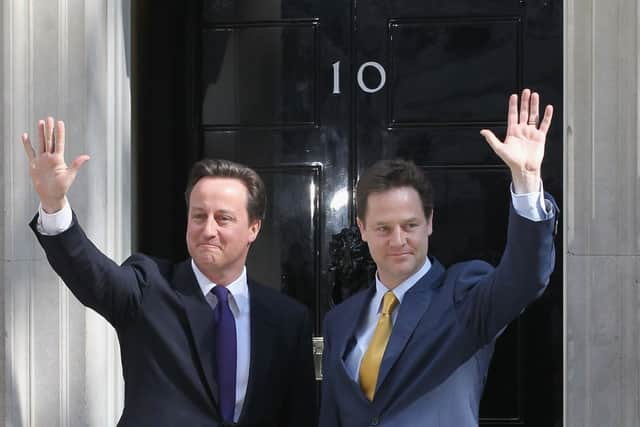Nick Clegg: 2010, when the former Liberal Democrat leader was the nation’s darling
and live on Freeview channel 276
Nick Clegg will be back in the headlines as a landmark summit on AI safety takes place at Bletchley Park in the UK. Now working with one of the biggest tech companies in the world, Meta, Clegg's political days are far behind him, but not forgotten.
It’s 2010 and the UK is about to usher in over a decade of Conservative political power. But the man hot on everyone’s lips back then isn’t Tory leader David Cameron. It’s the Liberal Democrat leader whose popularity is on the rise and who no one seems to be able to disagree with.
Advertisement
Hide AdAdvertisement
Hide AdThe run-up to the 2010 general election on May 6 saw political leaders Nick Clegg, David Cameron, and Gordon Brown - who was the Labour leader and Prime Minister at the time - battle it out on what was the first election debate to be broadcast live on TV. This was broadcast on ITV with subsequent debates on Sky News and the BBC.


After the first debate in mid-April - dominated by themes including the NHS, Immigration, and political reform - it was clear that Clegg had come out on top. And so 'Cleggmania' was born as polling figures showed this to be the case across the spectrum:
- ITV News/ComRes: 43% for Clegg, 26% for Cameron, 20% for Brown
- Sky News/Fizzback: 37% for Clegg, 32% for Brown, 31% for Cameron
- Times/Populus: 61% for Clegg, 22% for Cameron and 17% for Brown
- Sun/YouGov: 51% for Clegg, 29% for Cameron, 19% for Brown
- Angus Reid Public Opinion: 49% for Clegg, 20% for Cameron, 18% for Brown
Headlines after the first debate spoke of how Clegg 'stole the first televised leaders' debate' and how he was able to assert his dominance. A well-remembered quote from him during the debate summed up his approach. He said: "Don't let them tell you that the only choice is between two old parties that have been playing pass the parcel with your government for 65 years now making the same old promises, breaking the same old promises." Things did even out after the second debate on Sky News and the third debate on the BBC saw Cameron begin to marginally assert some dominance. But the former Lib Dem leader had succeeded in laying down a marker alongside his much more popular political rivals. The election the following month showed how this had not dwindled so quickly.
A disastrous election for Brown saw Labour lose 91 seats, while the Tories gained 96 seats. The Lib Dems pulled in 23 percent of the vote - a one percentage point increase. It was enough to stop an outright winner in the election and create a real palaver for the Conservatives.
Advertisement
Hide AdAdvertisement
Hide AdNo party had reached the 326 seats needed for a majority, which led to a hung Parliament. This was only the second time this had happened since the Second World War. This led to a coalition government to get the Conservatives over the line. After five days of talks, a coalition government was announced on May 12 once the Lib Dems accepted the proposed agreement.
The success of Clegg in the run-up to the election landed him the role of Deputy Prime Minister which he held until 2015. But a tumultuous coalition saw the Lib Dems fail to make the impact they had hoped. Policies - such as reforming the House of Lords- failed to win Conservative support and Clegg was forced to drop much of the change he hoped to bring through.


And thus began the next chapter of Clegg's perception - from hero to a figure many grew to despise. From projecting himself as a man of change and confidence in the election debate, opinions had altered within a year.
In the run-up to election day, Clegg had made his own promises on policy that people would expect him to keep. He pledged to oppose any rise in student tuition fees, oppose VAT hikes, and he had been clear that he wanted to cut spending more gradually than the Tories.
Advertisement
Hide AdAdvertisement
Hide AdOnce in the coalition government, he broke those pledges too readily in the eyes of much of the electorate. First, he backed rapid and deep spending cuts, then endorsed George Osborne's hike in VAT from 17.5% to 20% in last June's emergency budget. But perhaps his most grave breach of trust was his backing for government plans to treble tuition fees.
The fall was meteoric and Clegg has not returned to politics since 2017. He currently works for Meta as President for Global Affairs.
Comment Guidelines
National World encourages reader discussion on our stories. User feedback, insights and back-and-forth exchanges add a rich layer of context to reporting. Please review our Community Guidelines before commenting.
